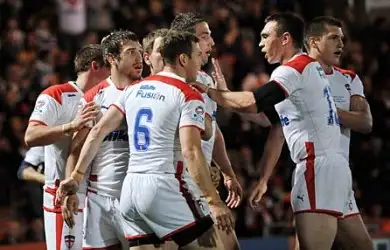England v. All-Stars a good idea – on paper

So it seems that England will be playing an Overseas XIII or “Super League All Stars” this summer in the latest chapter of the never-ending quest for decent opposition. England are in a curious position in this regard, being of a demonstrably lower standard than Australia or New Zealand, but of a much higher standard than anyone else. The result of this has been a series of one-sided encounters in recent years with France, an annual fixture which seems to become less competitive each and every season.
Before last season’s encounter at Leigh dire warnings were issued about the fixture being scratched from the international calendar, and after England strolled to a 60-6 victory such may well prove to be the case.
Now, the RFL has not confirmed that the game against France has been cancelled. In fact the All-Stars fixture itself has not been announced: the story broke in the Guardian courtesy of Andy Wilson. I could find no trace of it on the RFL’s official website, nor do England have any fixtures scheduled on their website. But the Guardian story is probably accurate, and if this was to go ahead it’s hard to imagine two mid-season internationals being scheduled for England.
The idea seems to be that the one player from each club will be selected, with the fans invited to vote for who they think should be selected. Now, if this is being proposed as a serious fixture, this is problematic. The coach of the All-Stars will be denied an open selection, and the side that turns out won’t be the best available, and the whole point is to provide England with competitive opposition. The suggestion of fans voting is a good one insofar as it creates interest in the fixture, but public votes are notoriously unreliable things: let’s not forget that John Sergeant nearly won Strictly Come Dancing in 2008.
To be honest I’ve always been a bit sceptical anyway about the idea of an All-Stars team, and the idea that it would provide effective opposition. After all, you’ve basically created a team out of nothing specifically for you to play against and (hopefully) beat. They’re not really representing anything, and this is supposedly representative football. You may disagree, but it’s hard to imagine the chosen players really being motivated for this encounter, and even if they were motivated individually it’s hard to imagine them gelling as a team.
You can also add that the All-Stars aren’t going to win much in the way of support from fans, as even fans of the players’ respective clubs will be – by and large – supporters of England. Even Crusaders supporters aren’t likely to be motivated to give their support to an All-Stars team, because such a team doesn’t represent Wales any more than anywhere else. You could argue that very few French supporters turned out to support their team, but at least you knew that they did exist somewhere, and they did turn out for games in Toulouse and Paris. The absence of support is one of the reasons why such a game feels artificial and manufactured – a good idea on paper, but one that probably wouldn’t work out in real life.
For all the faults I would prefer England to be playing against representative sides that actually exist, and in addition I would support holding more England internationals, perhaps two or three in mid-season and one or two prior to the Four Nations – because, firstly, I enjoy watching international rugby league, and secondly, because it helps the players come together as a team. Cumbria showed last season that England (albeit, a slightly understrength England) can be provided with a tough game by claiming an 18-18 draw, while France gave England a genuine fright by holding a 12-4 lead at half-time in the 2009 Four Nations.
There are issues of player burnout and so forth, but there are ways reducing the number of fixtures played by clubs. There’s also the argument that games against Wales and France won’t help England reach the standard set by Australia and New Zealand, but realistically mid-season internationals and warm-up games aren’t ever going to achieve that. There’s a case then for playing games with some representative meaning rather than taking on an artificial side in an artificial setting.
Keep Your Eye On Rugby League